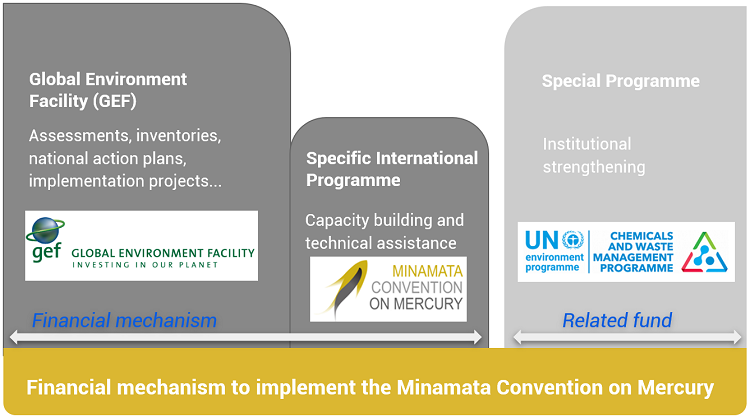The Minamata Convention on Mercury, under Article 13, sets up a financial mechanism to support developing country Parties and Parties with economies in transition in implementing their obligations under the Convention. The Mechanism is composed of:
- The Global Environment Facility Trust Fund (GEF)
- The Specific International Programme (SIP) to support capacity-building and technical assistance.

GEF
The relation between the GEF and the COP is defined by a Memorandum of Understanding that was agreed by both the COP and the GEF Council. In carrying out its role as part of the Convention's Financial Mechanism, the GEF operates under the guidance of the Conference of the Parties (COP) regarding overall strategies, policies, programme priorities and eligibility for access to and utilization of financial resources. COP guidance to the GEF, which includes an indicative list of categories of activities that could receive support, was adopted at COP1 in 2017, and can be found in the decision MC-1/5.
The GEF’s funding for mercury has been provided to developing countries and countries with economies in transition to prepare Minamata Initial Assessments (MIAs) and artisanal and small-scale gold mining (AGSM) National Action Plans (NAPs), and to undertake projects designed to support implementation of particular articles of the Convention. Some GEF projects are carried out under broader programmatic approaches, such as the PlanetGOLD program to support the transition away from mercury use in artisanal and small-scale gold mining. PlanetGOLD has projects in eight countries and a powerful knowledge management component to foster the sustainability and scaling up of project results. The GEF ISLANDS (Implementing Sustainable and Low and Non-Chemical Development in SIDS) program will work in 30 Small Island Developing States to manage the growing impacts of chemicals and wastes on their environments, including management of at least 38 metric tons of mercury from products, health care and other use sectors.
At each COP the GEF reports on its work to support Parties and how it has responded to the guidance provided by the COP: GEF report to COP1 (UNEP/MC/COP.1/INF/3), COP2 (UNEP/MC/COP.2/INF/3) and COP3 (UNEP/MC/COP.3/INF/2).
SIP
The Specific International Programme was set up to deliver direct capacity building and technical assistance to developing-country Parties and Parties with economies in transition as they implement their obligations under the Convention. The COP agreed to Terms of Reference for the SIP and establishment of its Governing Board at COP1 decision MC-1/6 and updated at COP2 in decision MC-2/11 (page 51). The Secretariat manages the project submission, screening and appraisal process for each SIP round, while the SIP Governing Board reviews project submissions and allocates available funding to selected projects. Governments, the private sector, foundations, non-governmental organizations, international organizations, academia, and civil society actors can contribute to the SIP through the Specific Trust Fund managed by the Secretariat.
Review of the financial mechanism
The COP conducts periodic reviews of the financial mechanism, including the level of funding, the guidance provided by the Conference of the Parties and the mechanism’s effectiveness and ability to address the changing needs of developing-country Parties and Parties with economies in transition. On the basis of such reviews, the COP will take appropriate action to improve the effectiveness of the financial mechanism. The first review was completed at COP3 (decision MC-3/7). To assist the Parties to complete the review, the Secretariat provided the COP with an update on the activities of the GEF (UNEP/MC/COP.3/9) and a report on the activities of the SIP (UNEP/MC/COP.3/10) and its Governing Board (UNEP/MC/COP.3/10/Add.1).
Parties are encouraged to contact the Secretariat or other partner organizations, including GEF implementing agencies and the UNEP Global Mercury Partnership, to discuss project ideas.
Special Programme
Eligible Parties can also seek support from the Special Programme managed by UN Environment’s Chemicals and Waste Branch, which is designed to enhance sustained institutional capacity to develop, adopt, monitor and enforce policy, legislation and regulation for effective frameworks for the implementation of the Minamata Convention, the Basel, Rotterdam and Stockholm Conventions and the Strategic Approach to International Chemicals Management (SAICM).